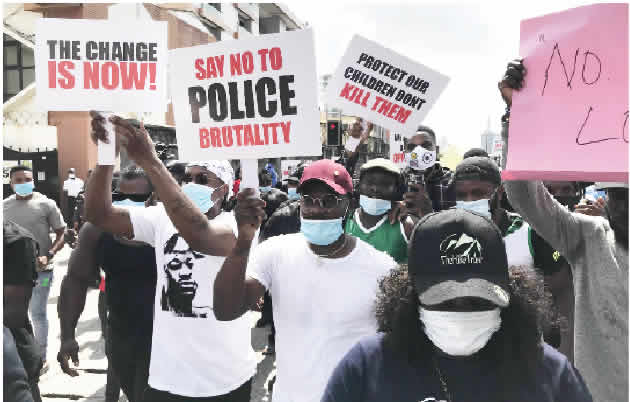
MISCONDUCT by Nigeria Police personnel is back in the spotlight. Apart from the swirling protests on the premature death of singer, Ilerioluwa ‘MohBad’ Aloba, 27, in controversial circumstances, two other recent incidents of police brutality in Rivers and Lagos states are fuelling public ire. Already, rallies over Aloba’s death are spreading and threatening to spin out of control after police teargassed protesters during a candlelight procession in his memory at the Lekki Tollgate, Lagos, on Thursday. This immediately evokes the harrowing October 2020 #EndSARS youth protests about police atrocities and the killings that followed at that venue by soldiers and police of unarmed protesters.
Nigerians are dismayed that after a brief lull, rogue police officers are back to their notorious ways of arbitrary arrests, extortion, detention, torture, and extrajudicial killings that precipitated the nationwide #EndSARS protests, which attracted global attention and traumatised the country.
Protests broke out after allegations surfaced on social media that the police treated a petition alleging that another singer and record label owner, Azeez Fashola, aka ‘Naira Marley,’ and his associate, Samson ‘Sam Larry’ Balogun, had been threatening Aloba and destroyed his movie production in June, with levity. In their defence, police said they invited Aloba, but he did not turn up.
Distraught youths dispute the police account. They accuse the police of siding with his alleged persecutors. Since the singer’s death on Sept 12, rallies demanding justice have been held in several cities across the country, and overseas. On Thursday, police aggravated the tension by firing teargas at protesters in Lagos, which recalled the police and military aggression against the youth during their annual #EndSARS anniversary rallies.
The MohBad case is not isolated. Rogue police officers, allegedly hired by a private citizen, invaded a shop in Lekki on September 19 and beat up an attendant, jumped on her and almost stripped her naked, over a transaction dispute. Illogically, police have reportedly turned round to accuse the victim of attacking officers!
The police told a similar fable when officers murdered Victor Emmanuel at a checkpoint in Yenagoa, Bayelsa State, in 2011. An officer has since been sentenced to death for that cold-hearted killing.
It seems the police have learnt no lesson from the #EndSARS protests, sparked largely by the extortion, torture and killing of youths. In a viral video posted on September 1 from Port Harcourt, Rivers State, a woman identified simply as ‘Jennifer,’ accused police officers of brutalising her sister. Last April, Police HQs in Abuja summoned four officers who assaulted a man over a minor traffic dispute in the same city. In June in Ekpoma, Edo State, officers callously ran their official van over a suspect who was handcuffed and already lying on the ground.
Despite the increasing frequency of punishments meted out to unruly officers by the police bosses, some police officers persist in criminality. In October 2022, some officers extorted N100,000 from a man they arrested on a Lagos street after they forced him at gunpoint to a PoS operator to withdraw the money from his account. The Lagos Command refunded his money.
Earlier that July, some Rapid Response Squad officers extorted N50,000 from a bus driver and two passengers at Fadeyi, Lagos. In December 2022, officers enforcing the ban on commercial motorcycle operations killed an operator in Ikorodu who resisted their attempt to seize his motorcycle.
Several other cases have been reported that sully the Force’s reputation. In August 2022, police officers allegedly invaded a property in Ajao Estate, Lagos, and ejected a female lawyer, destroying assets worth hundreds of millions of naira. Earlier, a security guard, Koleosho Abayomi, demanded justice after accusing police officers of shooting him in the thigh at the Lekki Peninsula Scheme II, in the Eti Osa Local Government Area of Lagos State, The PUNCH reported.
Unwittingly, police are preparing the ground for another uprising, which might be more destructive than that of October 2020 because, in 2023, poverty and anger have multiplied. President Bola Tinubu, and the Acting Inspector-General of Police, Kayode Egbetokun, should take stronger actions now to deter the rogue police officers in the Force.
The Lagos Chamber of Commerce and Industry put the losses to the violence that followed the #EndSARS protests at N700 billion; the Nigerian Employers Consultative Assembly estimated the losses at N5 trillion. Police said 205 police stations were burnt nationwide, and many shops and warehouses were looted. Amnesty International said that police killed 15 protesters.
With the turbulent economy, the prevailing mass poverty and mass anger, and 53.4 per cent youth unemployment, an outpouring of frustration on the streets today could spiral out of control, worse than the 2020 debacle.
Tinubu and Egbetokun should therefore move more strongly to stop police brutality. There must be real reforms, and new rules of engagement implemented. Apart from swiftly punishing rogue officers, senior officers who deploy them to the field must be held accountable. Since sanctioning offending officers has not deterred others, supervisors and commanders must be motivated to exercise more effective control over their subordinates by also being sanctioned for their excesses.
Reforms should encompass recruitment, which is part of the problem. Former President Olusegun Obasanjo and former IGs Sunday Ehindero, and Mike Okiro, separately confirmed that over time, criminals were recruited into the system. This is manifesting in many ways. Such felons must be identified and expelled.
It is time to deploy intelligence and technology, including listening devices, drones and especially body-worn cameras, which record the interactions between police and citizens. This is widely in use by police in the United States and EU member states. Lagos State is pioneering this in Nigeria.
The IG should quickly fulfil his promise to withdraw officers illegally attached to VIPs and redeploy them to the field to reduce the pressure on the few officers securing the country and citizens with field patrols and emergency responses.
Democracy thrives on active civic participation; Nigerians should continue to demand that the police are answerable to the people, embark on peaceful protests when necessary, and insist on accountability and justice from agents of the state.













